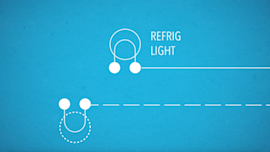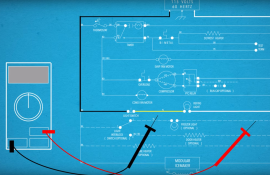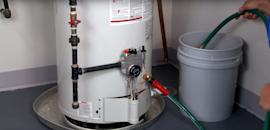GE GeoSpring water heater error codes

These error code explanations can help you diagnose a problem with your GE GeoSpring water heater.
The control panel beeps and the error code appears in the digital display when the control detects a component failure. For example, when the control detects that the evaporator fan isn't running, the GeoSpring water heater displays the F4 code and its control panel beeps. Follow the troubleshooting tips shown in the chart below to diagnose and repair the F4 code or other codes that appear in the display.
To find repair parts, search for your model number to find a complete list of replacement parts for your water heater.
For repair how-to help, visit the PartsDirect repair help section, which includes repair help for water heaters, major appliances, lawn and garden equipment, garage door openers, vacuum cleaners and more.
Compressor discharge temperature not rising
The T4 sensor (compressor outlet temperature sensor) must detect at least a 20-degree temperature rise during the first 30 minutes of run time. Disconnect the power or unplug the water heater and check T4 sensor mounting, wiring and ohm resistance. T4 sensor should measure approximately 55k ohms at 77 degrees Fahrenheit or 188k-2k when the compressor discharge temperature is 30-250 degrees. If all the steps above check out and the compressor outlet temperature still is not rising, call a service technician to check the sealed refrigerant system for proper charge and to check the thermal expansion valve (TXV).
Compressor discharge temperature not stable
The T4 sensor (compressor outlet temperature) must be greater than 120 degrees Fahrenheit after 30 minutes of run time. Disconnect power or unplug the water heater and check T4 sensor mounting, wiring and ohm resistance. T4 sensor should measure approximately 55k ohms at 77 degrees or 188k-2k when the compressor discharge temperature is 30-250 degrees. If all the steps above check out and the compressor discharge temperature still is not stable, call a service technician to check the sealed refrigerant system for proper charge and the thermal expansion valve (TXV) operation.
Evaporator frosted over
The T3a sensor (evaporator inlet temperature) must be greater than 20 degrees Fahrenheit after 30 minutes of run time. Disconnect power or unplug the water heater and check T3a sensor mounting, wiring and ohm resistance. The T3 sensor should measure approximately 10k ohms at 77 degrees or 57k-3k when the evaporator inlet temperature is 15-130 degrees. If all the steps above check out, call a service technician to check the sealed refrigerant system for proper charge and the thermal expansion valve (TXV) operation.
Super heat is too low
Disconnect power or unplug the water heater and then check temperature sensors T3a, T3b and T5 mounting, wiring and the ohm resistance of each sensor. Sensors T3a, T3b and T5 should measure approximately 10k ohms at 77 degrees Fahrenheit. Check and clean the filter. If all the above steps check out, call a service technician to check the sealed refrigerant system for proper charge and the thermal expansion valve (TXV) operation.
Discharge temperature above the limit
The compressor discharge temperature exceeded 240 degrees Fahrenheit. Verify that T4 sensor (compressor outlet temperature sensor) measures approximately 188k-2k ohms after 30 minutes of run time. Disconnect power or unplug the water heater and then check T4 sensor mounting, wiring and ohm resistance. If all the above steps check out, call a service technician to check the sealed refrigerant system for proper charge and the thermal expansion valve (TXV) operation.
Tank temperature sensor failure
The control checks the T2 tank sensor temperature before the compressor starts and it must be 30-u2013170 degrees Fahrenheit. Disconnect power or unplug the water heater and then check T2 sensor mounting, wiring and ohm resistance. The ohm resistance should measure approximately 10k ohms at 77 degrees. If the T2 sensor is okay, replace the power control board (PCB).
Compressor failure
The control energized the compressor but the current sensor does not detect any current flow. Disconnect power or unplug the water heater and then check the compressor, relay and wiring. Call a service technician if the compressor has failed.
Fan failure
Disconnect power or unplug the water heater and then check the evaporator for a loose or broken wire connection. If fan motor wiring connections are okay, replace the evaporator fan motor. If the F4 code returns after replacing the evaporator fan, replace the power control board (PCB).
T3a sensor failure
Before the compressor starts, the control checks that T3a, T3b and T5 sensors are all within 15 degrees Fahrenheit of each other. Disconnect power or unplug the water heater and then check T3a sensor mounting, wiring and resistance. The ohm resistance of the T3a, T3b and T5 sensors should measure approximately 10k ohms at 77 degrees. If the sensors are okay, replace the power control board (PCB).
T3b sensor failure
Disconnect power or unplug the water heater and then check the T3b (evaporator sensor) sensor mounting, wiring and the ohm resistance of the sensors. The ohm resistance of sensors T3a, T3b and T5 must measure approximately 10k ohms at 77 degrees Fahrenheit. If the sensors are okay, replace the power control board (PCB).
T4 sensor failure
Disconnect power or unplug the water heater and then check the T4 (compressor outlet sensor) mounting, wiring and ohm resistance of the T4 sensor. The ohm resistance of T4 sensor should measure approximately 55k ohms at 77 degrees Fahrenheit. If the sensor is okay, replace the power control board (PCB).
T5 sensor failure
Disconnect power or unplug the water heater and then check the T5 (ambient temperature sensor) mounting, wiring and ohm resistance. The ohm resistance should measure approximately 10k ohms at 77 degrees Fahrenheit. If the sensor is okay, replace the power control board (PCB).
Lower heating element failure
Disconnect power or unplug the water heater and then check the lower heating element and wiring. Check the wiring and connections on the power control board (PCB) and lower heating element. Disconnect the wires from the lower heating element and measure the heating element for ohm resistance using a multimeter. The heating element should measures 12.8-18.75 ohms of resistance. If the lower element and wiring is okay, replace the power control board.
Upper heating element failure
Disconnect power or unplug the water heater and then check the upper heating element and wiring. Check the wiring and connections on the power control board (PCB). Disconnect and measure the heating element for ohm resistance using a multimeter. The heating element should measure 12.8-18.75 ohms of resistance. If the upper element and wiring are okay, replace the power control board.
Most common symptoms to help you fix your water heaters
Choose a symptom to see related water heater repairs.
Main causes: lack of power, no gas supply, thermostat limit switch tripped, bad element, bad thermostat, gas valve failu…
Main causes: thermostats need adjustment, water heater capacity too low, bad heating element, thermostat failure, excess…
Main causes: loose water pipe fittings, leaky drain valve, bad temperature-pressure relief valve, leaky heating element,…
Main causes: water supply needs chlorine treatment, anode rod too reactive…
Main causes: broken heating element, thermostat failure, excessive tank sediment, tank size too small, burner valve asse…
Main causes: thermostat temperature set too high, thermostats need adjustment, faulty thermostat, shorted heating elemen…
Main causes: faulty pressure relief valve, water is overheating…
Most common repair guides to help fix your water heaters
Effective articles & videos to help repair your water heaters
Use the advice and tips in these articles and videos to get the most out of your water heater.

Learn some of the most common symbols found in a wiring diagram and what they mean.…

Find out what’s wrong with your appliance by following a circuit.…

Read about some water heater repairs that you can easily do yourself.…